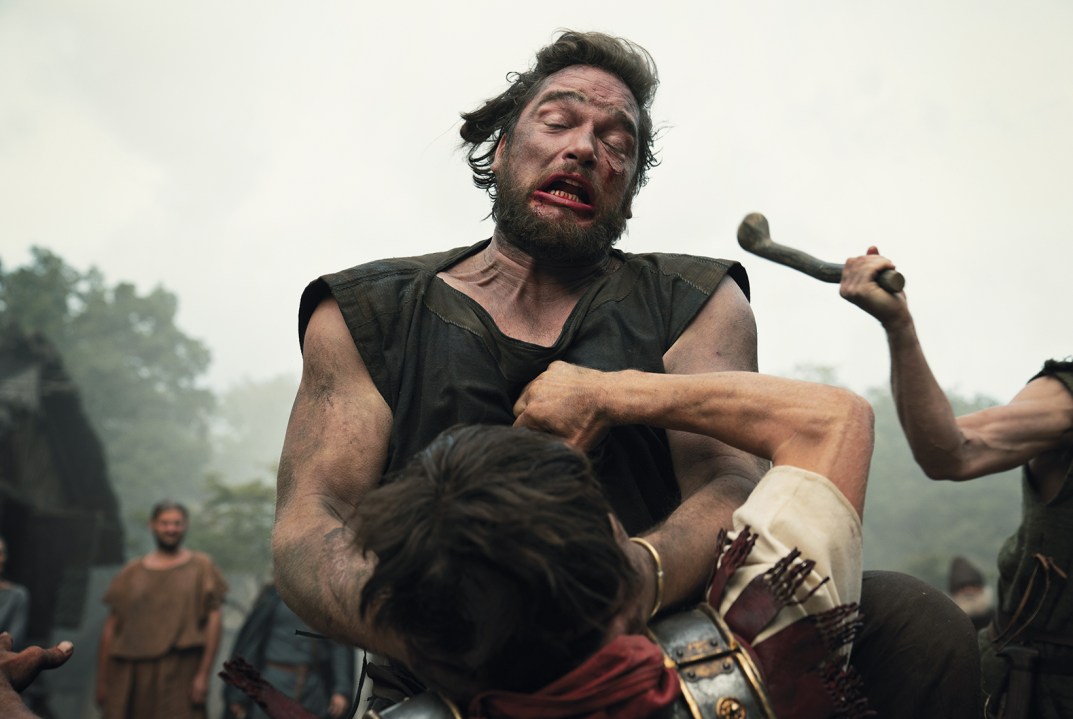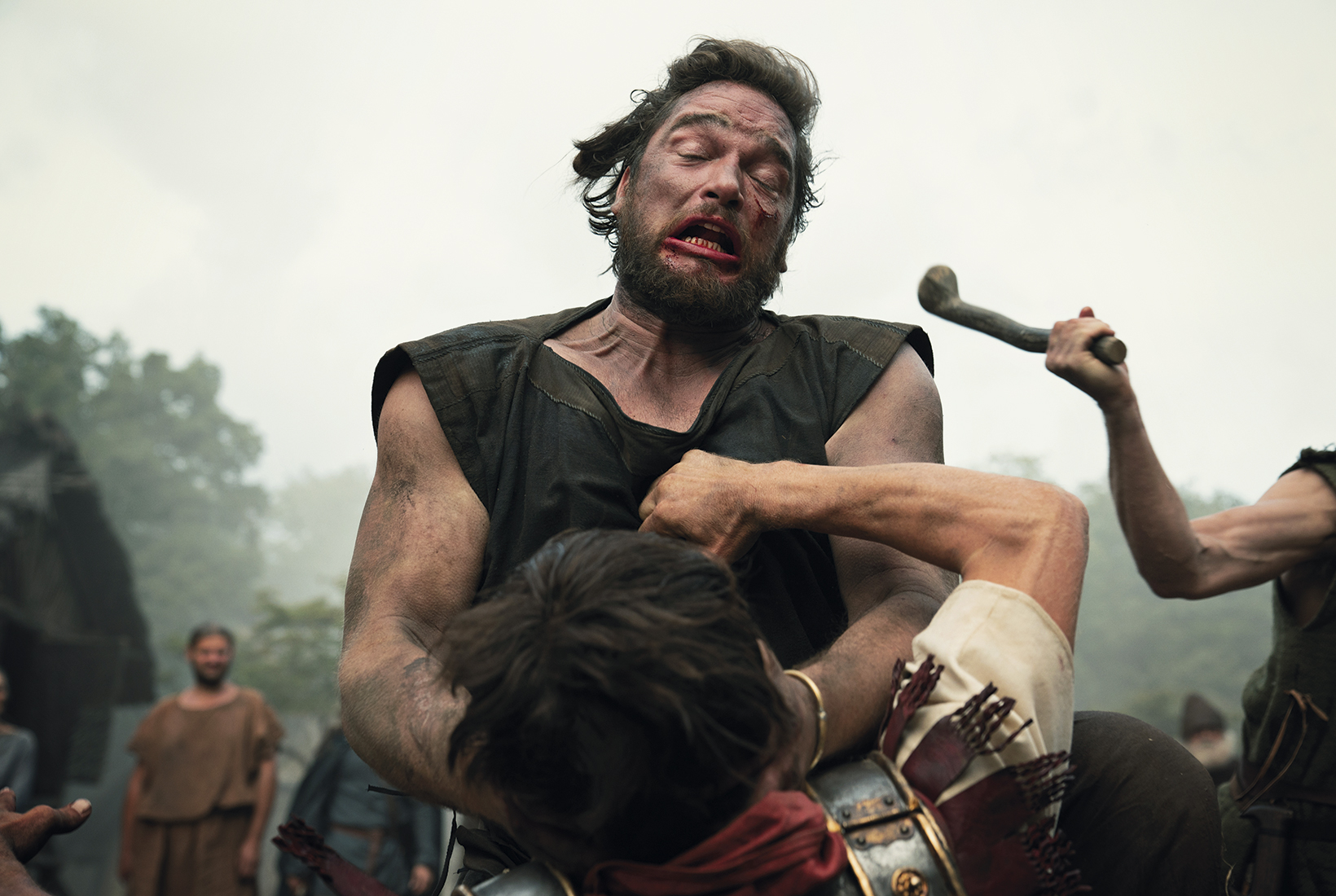Of all the times and places to have been on the wrong side of history, I can’t imagine many worse than to have been a Roman legionnaire in the Battle of the Teutoburg Forest in the year 9 AD. It was the Romans’ Isandlwana — a devastating defeat inflicted by native forces on what was theoretically the world’s most sophisticated, best trained, and almost insuperable military power.
Over the years since I first learned about arrogant, tricked, doomed Roman commander Varus and his three legions (about 20,000 men, almost none of whom got out alive), I’ve often mused pityingly on how it must have felt: trapped in the gloomy forest, hemmed in by a bog, waiting to be slaughtered by hammer, axe or javelin by the hairy, painted, blood-crazed Germanic barbarians. Not this year, though. What I’ve finally understood in 2020 is that those Roman bastards had it coming.
And I don’t think I’m the only one who feels this way. Barbarians, a German-language adaptation of the story by Arne Nolting and Jan Martin Scharf, is one of the top-rated dramas on Netflix. One reason for its popularity, I’m sure, is that we’re all sick to the teeth of remote, bullying, supranational entities telling us how to live our lives. We want our Teutoburg Forest and we want it now.
This is one of the TV events of the year: in one episode, it approaches pure genius
At the moment, sadly, we’re sorely lacking an Arminius to lead us to victory. Arminius (Laurence Rupp) was the German nobleman, snatched as a child hostage from his Cherusci tribe and brought up as a Roman, who rose to the rank of equestrian but then betrayed his own adoptive people by leading their army into a trap.
It’s such a powerful, mythopeic story that any dramatisation of it was bound to be worth a watch. But I’m afraid if you’re looking for something in the league of Last Kingdom, you’ll be disappointed. Unfortunately, the German writers just don’t have the gift of Bernard Cornwell and his adaptors for fleshing out an ill-documented period of history and allowing its characters to breathe.
Neither Arminius nor his hot, fierce, blonde warrior girlfriend Thusnelda (Jeanne Goursaud) nor his love rival (an invented character called — ludicrously — Folkwin Wolfspeer) are much more than generic cut-outs, going through the motions in vague accordance with historical events. The acting is mostly good enough but again, certainly not in the league of Last Kingdom where some of the performances — David Dawson’s King Alfred, Ian Hart’s Beocca — are up there with the greats at the Royal Shakespeare Company in the days when it aimed for perfection.
Some of its choices work — such as the decision to have the Roman characters speak in Latin, which the show’s most impressive (and visually striking) performer Gaetano Aronica as Varus does especially well. But I did find myself yearning throughout for just a bit more of the shield-biting verisimilitude of Last Kingdom or Vikings. The Battle of Teutoburg Forest, when it comes, isn’t a patch on Tettenhall.
Tell you what I do recommend unreservedly, though: To the Lake. It’s a Russian-made series about a deadly flu pandemic — one that actually kills lots of people — and its consequences for a disparate group of typically Russian characters (drunken granddad, alcoholic nympho teenager, smouldering ex-wife from hell, etc.) making their way to sanctuary across the frozen wastelands to a remote lake where all their troubles will be over… Or will they? Obviously I wouldn’t dream of spoiling the ending, except to say that it must be about the most exultantly dystopian, chilling, jaw-dropping pay-off since that Planet of the Apes movie where you see the Statue of Liberty half buried in the sand. (There’s going to be a sequel, though heaven knows where it will go or how they’ll afford to make it.)
This is definitely one of the TV events of the year, imaginatively directed by Pavel Kostomarov, superbly acted, with a thrilling plotline, by turns funny, moving and terrifying, which keeps you gripped and surprised throughout. There’s one particular episode — five, though you must promise me you won’t skip to it — where you realise that this is far more than a ramshackle, semi-benign apocalypse drama steered by a crazy Russkie who was reared on experimental stuff like Twin Peaks and Pulp Fiction; that in fact it approaches pure genius.
The episode concerns the dawning realisation among a group of stock, almost-comedic Russian peasants that the state is even deadlier than the virus and that unless they resist, as their forebears did in the Great Patriotic War, then they might as well just kill themselves now. Lesson for us all in there, right now.








Comments